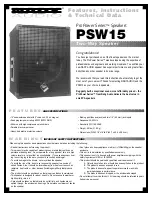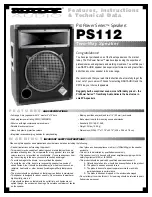
7
Nothing comes close to a Cobra
®
6
English
FCC Information
VHF Marine Radio
Procedures
Radio Call Sign
Currently, the FCC does not require recreational boaters to have a license. The United
States Coast Guard recommends that the boat’s registration number and state of registry
(e.g. Illinois 1234 AB) be used as a call sign and be clearly visible on the vessel.
Canadian Ship Station License
You may need a license if your vessel is operated in sovereign waters of a country
other than the U.S.A. If you are going to operate in Canadian waters, please contact
the nearest field office or write: Industry of Canada, Radio Regulatory Branch,
Attn: DOSP, 300 Slater Street, Ottawa, Ontario, Canada K1A 0C8.
User Responsibility and Operating Locations
All users are responsible for observing domestic and foreign government regulations
and are subject to severe penalties for violations. The VHF frequencies on your radio
are reserved for marine use and require a special license to operate from land,
including when your boat is on its trailer.
NOTE
This device complies with part 15 of the FCC Rules. Operation is subject to the
following two conditions: (1) This device may not cause harmful interference,
and (2) This device must accept any interference received, including interference
that may cause undesired operation.
FCC Warnings: Replacement or substitution of transistors, regular diodes, or other
parts of a unique nature, with parts other than those recommended by Cobra
®
may
cause a violation of the technical regulations of part 80 of the FCC Rules, or
violation of type acceptance requirements of part 2 of the Rules.
VHF Marine Radio Procedures
•
Maintain Your Watch
Whenever your boat is underway, the radio must be turned On and
be tuned to Channel 16 except when being used for messages.
Power
Try one (1) watt first if the station being called is within a few miles. If there
is no answer, switch to a higher power. This will conserve your battery and
minimize interference to other users.
Calling Coast Stations
Call a coast station on its assigned channel. You may use Channel 16
when you do not know the assigned channel.
Calling Other Vessels
Call other vessels on Channel 16 or on Channel 9. (Channel 9 is preferred
for recreational vessel use.) You may also call on ship-to-ship channels
when you know that the vessel is listening on a ship-to-ship channel.
Limits On Calling
You must not call the same station for more than 30 seconds at a time.
If you do not get a reply, wait at least two (2) minutes before calling again.
After three (3) calling periods, wait at least 15 minutes before calling again.
Change Channels
After contacting another station on a calling channel, change immediately
to a channel which is available for the type of message you want to send.
Station Identification
Identify, in English, your station by your FCC call sign, ship name, the state registration
number, or other official number at both the beginning and end of each message.
Prohibited Communications
You MUST NOT transmit:
■
False distress or emergency messages.
■
Messages containing obscene, indecent, or profane words or meaning.
■
General calls, signals, or messages (messages not addressed to a particular
station) on Channel 16, except in an emergency or if you are testing your radio.
■
When you are on land.
VHF Marine Radio Protocols
VHF Marine Radio Protocols







































